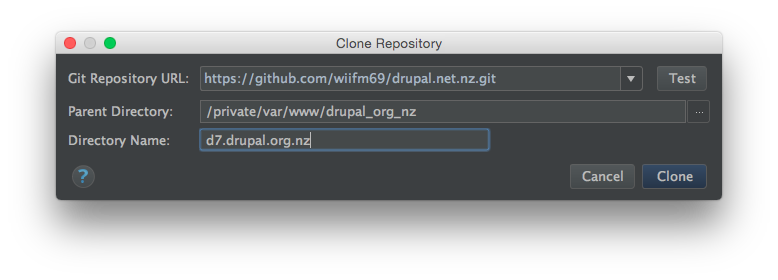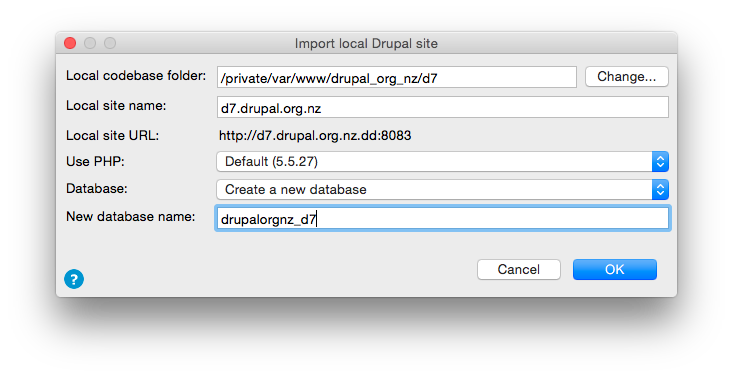Support notes for team collaboration around the drupal.org.nz project.
You should:
- Sign up to or ask for an invite to the Trello board
- Have an active account on live https://drupal.org.nz/. Ping someone on trello if you need account promotion.
- Supply your public ssh key to someone on the team so we can install it onto the live server and grant you drush-level pull access from live.
Live D7 site-alias: @drupal.org.nz
<?php
$aliases["drupal.org.nz"] = array (
'root' => '/var/www/drupalnetnz/live.taranto',
'uri' => 'drupal.org.nz',
'remote-host' => 'taranto.coders.co.nz',
'remote-user' => 'aegir',
'path-aliases' => array (
'%drush' => '/var/aegir/.composer/vendor/drush/drush',
'%drush-script' => '/var/aegir/.composer/vendor/bin/drush',
'%site' => 'sites/drupal.org.nz/',
'%files' => 'sites/drupal.org.nz/files',
),
);
In this document, the nominal localhost for development is named d7.drupalorgnz.dd .
Replace this with your own preferred name as appropriate.
Hosting is on a semi-dedicated server called taranto.coders.co.nz .
(On DigitalOcean, Looked after by dman)
For most deployment tasks, ssh access as the aegir daemon user
on that box is sufficient, and can be shared with the team.
-
Provide a team-member with your public ssh key.
-
That can be installed into
taranto.coders.co.nz:/var/aegir/.ssh/authorized_keys. -
Connect to the box one time to verify the connection.
ssh aegir@taranto.coders.co.nz -
Once that is working, you can use the drush alias.
-
Copy or create
drupal.org.nz.alias.drushrc.phpwith the site-alias details above into your ~/.drush folder (or similar location). -
Test your connection to that site instance:
drush -v @drupal.org.nz status
-
The Aegir (shared) user account on the server
- May be shared among the team,
- Can pull from our git repositories but should not be used to commit back
- has access to drush,
- owns all the web files
- has ability to read apache logs and hup apache,
- and is a mysql admin.
Live database connection details can be deduced/pulled from the drush alias automatically if needed.
The recommended way to pull a database snapshot is using drush sql-sync .
drush sql-sync @drupal.org.nz @d7.drupalorgnz.dd
Alternatively, you can fetch an sql-dump through the web UI using backup_migrate when logged in to the live site.
The live database server does not offer an open port for direct MySQL connections.
You can hit the database using a locally memorized password - typing:
mysql
should just work enough to give you lots of access.
However, If you wanted to connect directly:
drush @drupal.org.nz sql-cli
Is best, and is equivalent to something like:
mysql --user=drupalorgnz -p{dbconnectionpass} --host=taranto.coders.co.nz drupalorgnz_0
aegir@taranto:~$ mysql
mysql> create database drupalorgnz_sandbox;
mysql> GRANT ALL PRIVILEGES ON drupalorgnz_sandbox.* to drupalorgnz@localhost IDENTIFIED BY '{dbconnectionpass}';
The recommended way to pull copies of the latest live user files is using drush rsync .
drush rsync @drupal.org.nz:%files @d7.drupalorgnz.dd:%files
Alternatively, you can fetch the files through the web UI using backup_migrate when logged in to the live site.
Run that command with --debug option on to see the commands and paths being run if you would rather set up your own sftp mappings or syncs.
The Drupal7 codebase is public, and available for pulling from
https://github.com/wiifm69/drupal.net.nz.git
git@github.com:wiifm69/drupal.net.nz.git
For write access, talk to Sean, or figure out pull requests.
This repo is inherited from drupal.org upstream, so it includes all d.o history.
It does not use any special branch policy, everything is on master. Using local short-lived dev branches is recommended, but not enforced.
Contrib modules are added or upgraded via drush as tarballs, then committed directly via git.
Core upgrades are applied by re-attaching drupal.org as an upstream remote, then merging in the upstream changes.
The above details are all you need to get going. An example quickstart from scratch could look like:
Use either your CLI or IDE
/var/www/drupal_org_nz$ git clone git@github.com:wiifm69/drupal.net.nz.git d7
I use Acquia dev desktop.
Alternative processes are up to you.
cd d7/sites/d7.drupalorgnz.dd
echo "<?php" > ~/.drush/d7.drupalorgnz.dd.alias.drushrc.php
drush site-alias d7.drupalorgnz.dd >> ~/.drush/d7.drupalorgnz.dd.alias.drushrc.php
drush sql-sync @drupal.org.nz @d7.drupalorgnz.dd
drush @d7.drupalorgnz.dd cc all
( You may have to mess around with filepaths slightly - up to you. Either make the local filesystem resemble live, or variable_set the files paths in your settings.php to override them to reflect the local paths. Personally I most often use stage_file_proxy to handle this, but that is out-of-scope to explain )
mkdir sites/drupal.org.nz/files
mkdir sites/drupal.org.nz/private
mkdir sites/drupal.org.nz/private/temp
mkdir sites/drupal.org.nz/private/files
drush rsync -v @drupal.org.nz:%files @d7.drupalorgnz.dd:%files
We seem to have 89M of files uploaded to the site, so the downsync can take a while. That seems excessive for the amount of content...
But at this point you shoild have a working clone of current live.
See README.server.md
The Apache server has a verified SSL certificate installed, and live will bounce to https when possible.
Is through http://1stdomains.nz/ (don't ask why). It has a wildcard, to support additional subdomains for dev/test/preview, (but these will not be able to use the same SSL cert)
*.drupal.org.nz A 162.243.138.236
Yes, there was some historical duplication with both drupal.net.nz and drupal.org.nz being different working titles at diffent times. 2014+ : .net.nz (Managed by Bevan Rudge on behalf of the community) redirects to .org.nz (Managed by Dan Morrison on behalf of the community)

